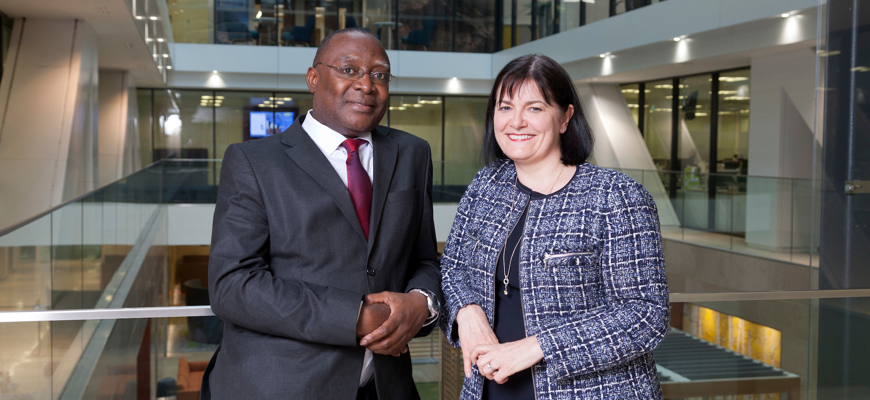A time to look ahead

A professional body of 12,000 practising members, the majority female; an international player taking pioneering initiatives in professional development and support; but at the same time an organisation facing fundamental questions about its future. What shape is the Law Society of Scotland in, as it marks its 70th birthday?
A survey of the past decade reveals a time of significant change, which aligns with the service of chief executive Lorna Jack.
Jack has a favourite story to illustrate changing perceptions of the Society over that period. Soon after she started, she found herself on a train with a woman carrying legal papers and introduced herself. Her surprised co-traveller commented about being “tracked” by the Society, and on Jack enquiring why she reacted in that way, “She started saying things like ‘Well when Drumsheugh Gardens gets in touch with me...’. I said: ‘That’s a building!’ And it all sounded very faceless, this inanimate object that did things to her. I don’t think people would describe us like that now.”
Not only because Drumsheugh Gardens itself belongs to the past. The move from converted New Town residences to state-of-the-art office space is symbolic of a Society that, Jack claims, is now seen as “a group of people doing things with, and for, the profession”.
“Probably the biggest change is that it’s much more of an open organisation, whether you measure that in the way we communicate with our members, or how visible our processes are to the public.” Those looking for a lawyer, young people considering a career, trainees and others, “all of those folks find it easier to engage with us now, directly making human contact on our hotlines or getting information from our website”.
Global status
As headlined in its Leading Legal Excellence five-year strategy, the Society sets “world class” standards for itself. How can it test whether it meets that challenge?
Finding suitable benchmarks is not easy, but Jack points to the attention being paid by others to some of its projects. “That’s when we know we’re world class and leading. There are some great examples of that. People are looking at what we’ve done in equality and diversity, what we’re doing on lawyer wellbeing, and bullying and harassment – we’re leading the field. The International Bar Association is a place where that becomes very obvious – we are invited on to panels to talk about it and other professional bodies say to us, ‘We’ve not done anything on this yet.’ But know they are needing to.
“It was no surprise that the International Bar Association came to our jurisdiction to launch their bullying and harassment guidance, because we had surveyed on this long before any other jurisdiction in the world.”
Likewise when Edward Sakala, executive director of the Law Association of Zambia, won an international bursary offering an internship with a law society in a developed jurisdiction, he chose Scotland “because, he said, ‘I looked at the breadth of what you were doing and how far advanced you were, and I thought, I can learn most from there’.”
Quick, quick, slowo change, as some have considered it?
“I think on some things we’ve been very rapid to change – we have taken decisions because the path is clear and things happen very quickly.” When she first arrived, practising certificate renewal involved sending out 10,400 notices on paper. “It took a team of six people in the Council room stuffing envelopes. So getting all that renewal online was just a no-brainer, and everyone could see the advantage because it was going to cut the PC cost, which we did and then held it steady for eight years because we went and did all the digital stuff.”
Other projects were trickier and deserved a more cautious approach, such as deciding the optimum size of Council. “That took three or four iterations and needed to be carefully thought through, because with different geographical areas, different sectoral areas of the profession we were trying to figure out what was the best model to have them represented.”
Roberton – which road?
Asked to name the biggest issues facing the Society today, Jack cites the challenges of achieving gender parity at senior levels in the profession, but also of understanding and addressing why relatively few men are now qualifying, as well as what business models might appeal to younger lawyers for whom partnership has lost its attraction. Another “biggie” for the next strategy paper is AI, both in terms of helping members deploy it and how to regulate for it, “because you can’t drop client confidence in the legal profession on the back of algorithms that might be assisting them to make choices in their legal problems”.
But top of the list is the Roberton report. Its core proposal that the Society cease to regulate the profession might be thought to pose an existential threat, but Jack does not buy that.
“The thing with Roberton is there are many ways to get there. People assume the regulatory functions will be taken from us; maybe it’s the other way round. There are multiple options and our thinking just now needs to be, what would we do, what would we say in response to multiple models. The Government has now promised to seek consensus. I don’t think anything is on or off the table: everything from full Roberton down to no change at all is in the mix.”
It is becoming clear, she adds, that this will not be addressed in the current Parliament, “and it’s important for us not to lose sight of the fact that we’ve got work to do in the next five years”. She praises her colleagues, who might have been worried about their futures: “I’m absolutely humbled at how unfazed they are... I think people understand how long this will take to happen, how likely it is, and somebody has to do this work, unless we’re suddenly going to drop all the consumer protections that the public have got used to. I don’t know if existential is how I would describe it. We just have to be ready for change.”
While some members continue to maintain that the Society’s dual role is irreconcilable, Jack observes that since the 2010 members’ referendum, when 20% or so took this view, “We’ve asked that question every year in our member survey and it’s dropped every year since.”
She continues: “The other fascinating thing from the annual survey is that we ask the question, what is the single most important thing the Society does? And their number 1 answer is regulation. Because they also want to adhere to high standards, and to see any bad behaviour rooted out. That matters to their clients.”
Is it not difficult to persuade the public that you are representing their interest as well as the profession’s? “Who speaks on behalf of the public?”, she counters. “We do public polling as well about people’s belief in both the brand of Scottish solicitor and their faith in something being done if there was inappropriate behaviour by a solicitor, and again those percentages are seriously high, up in the 80s and 90s.” Roberton herself made the point that the profession was highly regarded and respected, “So it was about perception. And I don’t think it’s the public’s perception.
“We’re very much a profession that’s about evidence, and stepping back, where is the evidence? For me, that’s the important point.”
Civic player
Grumbles surface among members at times about the Society keeping in with the Government, which supposedly inhibits its ability to take a stand on matters such as legal aid. But to Jack, “Our members have to balance conflicts like this every day. They have to balance doing the right thing by their client and being an officer of the court. So why should their professional body not be in a position where they have to balance it?” While legal aid is obviously important, there are other areas where the Society needs to work with Government, “for example the promotion of our commercial legal capability outside Scotland: the Government wants to join forces with us in that and it would be silly to say, we’re not going to because we’re fighting with you on legal aid. So we need to be more nuanced”.
When it comes to influence, the Society is increasingly a player as legislation passes through our Parliaments. “Every politician I ever meet mentions our law reform effort and our role in helping them make better legislation,” Jack recounts. “They rely on every single solicitor who gives up their time to look at legislation or to go and give evidence before committees, and that’s a huge job for civic society.” MSPs are also aware (and the Justice Committee has taken evidence) of how the Lawscot Foundation works and its role in widening access to becoming a lawyer.
Team spirit
Looking at the way the Society itself works, is its governance structure as efficient as it could be? “I think it’s better than it was. With the creation in the last 10 years of the Regulatory Committee, and subcommittees reporting up through it, that’s all pretty effective now. The committee itself has moved from organisation and processes and being quite reactive to things, into a mode of proactivity, asking what we should look at and tidy up next, and rather than more regulation, that could be about reducing parts or dealing with them more efficiently, because the burden is heavy on our members.
“The new Public Policy Committee is allowing us to prioritise appropriately on the law reform side, and Council is smaller, albeit I wouldn’t want to see it get any smaller because we would lose the representative voice around that table.
“Where we could go further is how that governance works – again the use of digital in place of paper, video conference links, there is more we could do to ensure we are engaging.”
Jack concludes by returning to the team spirit of her colleagues, and the collegiate ethos of the membership. “The most rewarding thing, for me personally in my first 10 years, are the people involved in this. We’ve got a phenomenal team, and a phenomenal group of solicitors on our Council and our committees. They bring their best every day; they are constantly looking for progress. The non-lawyers as well: when that change came in 2010 we imagined we might have to pay that group, but we haven’t. They’ve been willing to come and join us, and that tells you something about the quality of the organisation and why I’m confident about us.”
Regulars
Perspectives
Features
Briefings
- Corporate transparency and register reform
- Can we do it this way?
- Positive news, times two
- Sorted: the Planning Bill
- Debtor discharge: the letter of the law
- Structures allowance draft builds in improvements
- Age of the asylum seeker
- Scottish and English conveyancing: are the two compatible?
- Change? The basics still count






